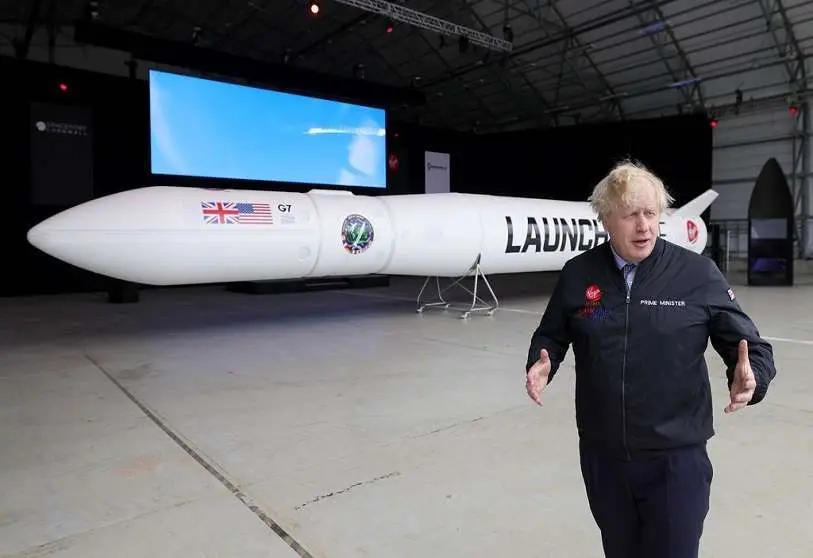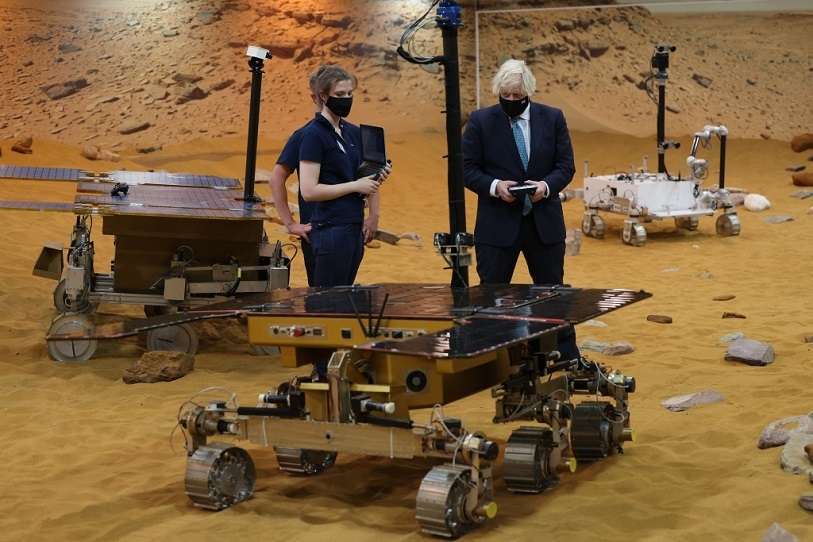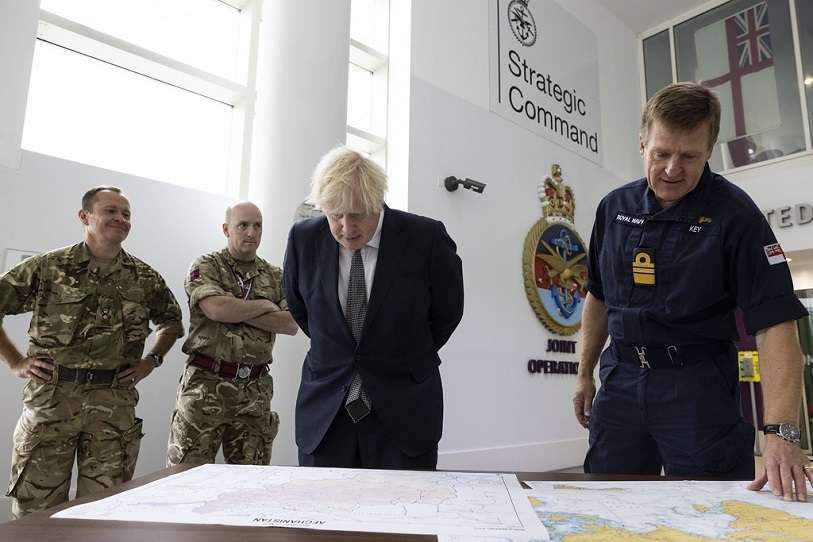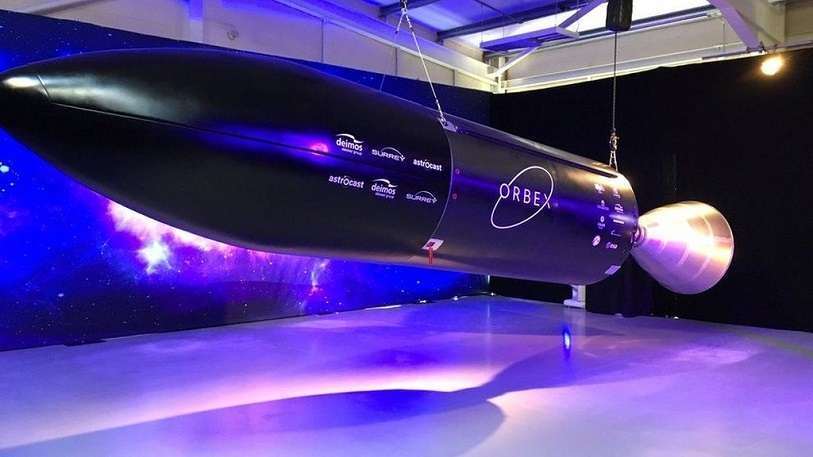Boris Johnson surprises the world and announces he will launch his first satellite from UK soil in 2022

British Prime Minister Boris Johnson, 57, also aims to transform the UK into a major space power. Faithful squire of Washington, as confirmed by the recent AUKUS alliance aimed at stopping Beijing's expansionism in the Indo-Pacific, the tenant of 10 Downing Street has clearly understood that if the United States, Russia and China invest billions of euros in the space sector every year, there must be a reason.
Under Her Gracious Majesty's shield, Boris Johnson's government has just published the National Space Strategy. In less than 40 pages and with a clear, direct and concise vocabulary, this document sets out the reasons why the United Kingdom wants to move "from a Global Britain to a Galactic Britain", as the Prime Minister himself states in the foreword to the official document.
The UK's National Space Strategy is a reflection of the reasons why Britain must make a determined bid to be among the countries leading the global space sector in science, technology and defence. Most notably, in the lucrative, growing and multi-billion dollar business of commercial applications derived from communications, observation and GPS-type positioning and navigation satellites. The OECD estimates that the global space economy will grow from €315 billion in 2019 to €570 billion in 2030.

So the Strategy aims to position the UK "firmly" at the "forefront of the global space industry", says Boris Johnson, and to capture a share of the pie that is up for grabs. The premier is emphatic in stating that "the days of the UK space industry sitting idle on launch pads are over". He concludes with the statement that "this government has got things right and this strategy marks the start of the countdown".
The strategy document specifies the four main pillars on which government action will be based from now on. Firstly, what it calls "unlocking" the growth of the UK space sector. This is spearheaded by the construction and commissioning of commercial space launch bases across much of the islands' geography. So far, seven sites have been approved, all of them located on the coast, five in northern and central Scotland, one in Wales and one in England.

For the time being, the Prime Minister himself says that, in 2022, domestic companies will launch the first rocket from European soil carrying satellites into space. He does not name the place of take-off, but it is likely to be from the spaceport at Cornwall airfield on the southern tip of England. But it will not be a conventional flight departing from a ground-based take-off ramp.
It will be a kind of "patriotic" contribution from British tycoon Richard Branson, the creator of the Virgin empire. It will be carried out by Virgin Cosmic's Boeing 747-400 Jumbo jet, an aircraft adapted for space launches and named Cosmic Girl. After departing from Cornwall airfield, it will be responsible for launching the LauncherOne rocket from UK airspace, a mission it has already carried out on several occasions in the United States.
One of the northernmost bases in Scotland is Shuterland, where the Spanish company Elecnor Deimos Space has partnered with the British companies Orbex, Surrey and Astrocast for the development, operation and launch of the Prime rocket. Headquartered in Tres Cantos (Madrid), the company headed by Ismael López and with a subsidiary in the United Kingdom brings to the project its experience and know-how in guidance, navigation and control, mission analysis, systems engineering and ground command and control stations.

The second pillar is to promote international collaboration, especially with the United States and Australia, but also with its neighbours on the Old Continent within the European Space Agency (ESA). This is an organisation outside the European Union in which London remains involved, particularly in telecommunications programmes, with ESA's Space Applications and Telecommunications Centre located in Harwell, near Oxford, since 2009.
Another key effort that the Strategy focuses on is the need to increase the UK's potential as a science and technology superpower. And the fourth will focus on developing 'resilient' space capabilities and services. In this last strand, it calls for the establishment of a National Space Operations Centre to 'fuse' economic, civil and national security expertise and activities into a single organisation. Its main task would be to "monitor, protect, defend and promote" the UK's interests in space.

London believes its space potential is no match for the threats it faces. The defence department led by Ben Wallace wants to make its Skynet constellation of military satellites more resilient to attack and interference. Skynet provides secure communications for the UK's armed forces and defence, as well as NATO.
It also aims to develop space-based platforms for ISR intelligence, surveillance and reconnaissance missions. To achieve this, Defence is committed to investing around £1.4 billion, or around ¤1.63 billion, in space technologies over the next 10 years.
On the civil and commercial side, the aim is to secure the operation of the large fleet of satellites of the communications companies Inmarsat, O3b and the Hylas satellites of the operator Avanti. Also OneWeb, an internet communications company in which Boris Johnson's government acquired a 45% stake together with an Indian company. The purchase took place in July 2020, when OneWeb was in a critical financial situation.

The strategy defines a ten-point action plan to steer and steer the four pillars outlined above on the right track, towards which public investment will be focused in the coming years and private contributions will also be channelled, with state aid. The first objective is to "capture the European market for launching small commercial satellites", as it is.
The London National Space Strategy does not contain a timetable of actions or a budget horizon. It is clear that it will do so at a later date, once Boris Johnson's government approves the Defence Space Strategy later this year or early next. However, to prepare the ground it already has a key tool at its disposal: the UK Space Agency (UKSA).

The UKSA is the organisation responsible for the UK's civil space programme. It was created in April 2010 by Labour Prime Minister Gordon Brown, who governed the country between June 2007 and May 2010. In early September, physicist Paul Bate was appointed chief executive of the UKSA to lead the new phase that is now opening up. With experience in the private sector and in the British administration, he was a direct advisor on health to Labour Prime Minister Tony Blair and later to Conservative Prime Minister David Cameron.









